A Circus Then, a Circus Now
The presidential campaign is, by some measures, in its second year. Here's what Chris Hedges had to say about the contest in January 2019.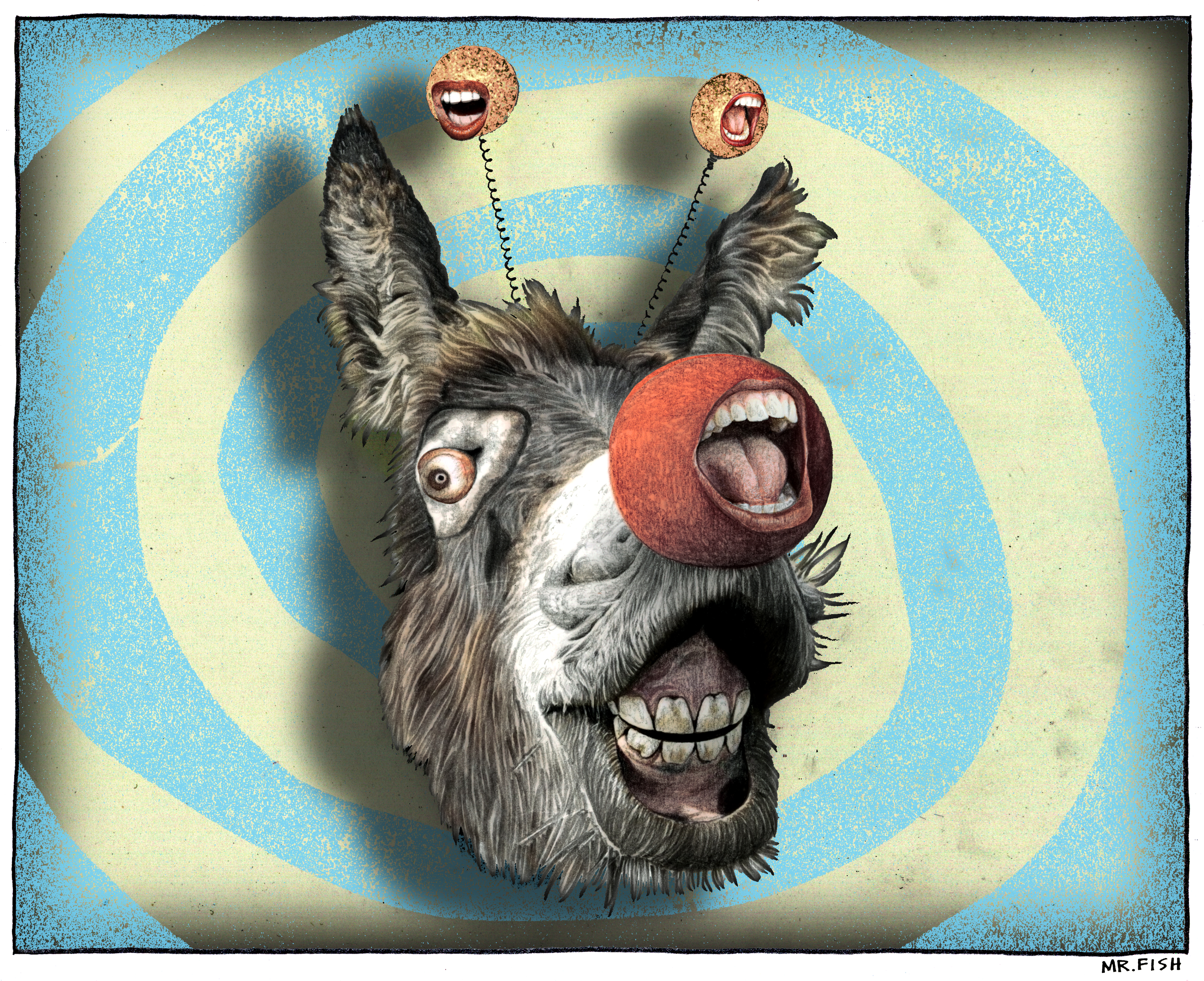 Mr. Fish / Truthdig
Mr. Fish / Truthdig
Chris Hedges has the week off. Here, in this reposted column from Jan. 7, 2019, are his thoughts about the then-nascent presidential election campaign.
It is January 2019. This signals the start of the 2020 election circus. Sen. Elizabeth Warren is the first big-name Democrat on stage. But we will soon be deluged with candidates, bizarre antics and endless commentary by fatuous TV and radio pundits. The hyperventilating, the constant polling, the updates on who has the largest campaign war chest, the hypothetical matches between this hopeful and that hopeful, the mocking tweets by Donald Trump, will, as we saw in the 2016 election campaign, have as much relevance to our lives and political future as the speculation on cable sports channels about next year’s football season. This farce takes the place of genuine political life.
It costs a lot of money to mount this spectacle. Our corporate masters, like the oligarchic rulers of ancient Rome who poured money into the arena as they stripped the empire and its citizens of their assets, are happy to oblige. The campaign sustains the fiction of a democracy and gives legitimacy to the corporate state. Maybe Hillary Clinton, who raised $1 billion in her 2016 run for president, will return for another season, although the Bill and Hillary tour is now a debacle with empty seats and slashed ticket prices. Maybe Joe Biden and Bernie Sanders will make comebacks. And what about the new faces in the scramble for the presidency—Beto O’Rourke, former New Orleans Mayor Mitch Landrieu, former Massachusetts Gov. Deval Patrick, former Attorney General Eric H. Holder Jr., former Housing Secretary Julian Castro, Sens. Kirsten Gillibrand, Cory Booker and Kamala Harris, Los Angeles Mayor Eric Garcetti and the billionaires Tom Steyer and Michael Bloomberg?
It is a political version of the reality television show “Survivor.” Who will be the first knocked out? Who will make it into the semifinals and the finals? Who is the most devious and cunning? Who will come out on top? We get to vote for the contestants that appeal to us most, or at least vote against those we hate the most. The cable news shows, in a prelude to the nonstop idiocy to come, have spent the last few days speculating about whom Mitt Romney will endorse in the 2020 race. Now there’s a burning question of national importance.
To take power in 2021 in lieu of any real policy changes, the Democratic Party is banking on the deep animus toward President Trump. It has no intention of instituting genuine populist programs, rebuilding unions, funding universal health care, providing free college tuition or curbing the criminal activities of the corporations and the big banks. The war machine will continue to wage endless war and consume half of all discretionary spending. The vaunted new populist members of Congress will be no more than window dressing, trotted out, like Sanders, to trick voters into thinking the Democratic Party is capable of reform. Most voters, for this reason, are “voting out of loathing, against enemies and against the system in general, not really for anybody,” as journalist Matt Taibbi points out.
Working men and women especially despise the slick-talking politicians—including the Clintons and Barack Obama—and the “experts” and well-groomed pundits on their screens who sold them the con that deindustrialization, deregulation, austerity, bailing out the banks, nearly two decades of constant war, the exporting of jobs overseas, tax cuts for the rich and the impoverishment of the working class were forms of progress. Trump hangs on to the support of white working Americans because he expresses through his adolescent insults and dynamiting of political norms the legitimate hatred they feel toward the well-heeled, college-educated ruling elites who sold them out. The Democrats, at the same time, understand that it takes someone as revolting as Trump to fire up their lethargic base, a group in which millions do not vote. They cling to a tactic of “anybody but Trump” even though it did not work in 2016.
The corporate media ignores issues and policies, since there is little genuine disagreement among the candidates, and presents the race as a beauty contest. The fundamental question the press asks is not what do the candidates stand for but whom do the voters like. As for now, Warren—the only nationally known Democrat except Julian Castro to form an exploratory committee for a presidential bid—is not winning this popularity contest. A CNN/Des Moines Register Iowa poll—yes, polling in Iowa already has begun—puts her fourth, with only 8 percent of support among the Democrats surveyed, behind Joe Biden, Bernie Sanders and Beto O’Rourke.
Our corporate rulers do not need to denounce democracy. Democratic laws, such as who can fund campaigns, have been subverted from within, their original purposes redefined by the courts and legislative bodies to serve corporate power. This managed democracy has transformed elections from the simple, straightforward process of voting for a party platform or party positions to vast, choreographed theatrical productions. Politicians run on “moral” issues and use public relations experts to create manufactured personalities. Trump, his image constructed by a reality television show, proved more adept than his rivals at playing this game the last time around.
Politicians must stick to the script. They have well-defined roles. They express a suffocating, reality-defying positivism about the future of America. They are steadfast in their obsequious praise of the nation’s “heroes” in the military and law enforcement. They are silent about the crimes of empire. They ignore the plight of the poor; indeed the word “poor” is banished from their vocabulary. They pretend we do not live in a corporate oligarchy, although they acknowledge amorphous attacks on the middle class and promise to stem the assault. They exude a cloying feel-your-pain compassion that revolves around personal stories of the hardships they overcame in their own lives to become “successes”—the most ludicrous being Trump’s claim that he turned a “very small” loan from his father into a multibillion-dollar real estate empire. They telegraph to us that they are one of us. We can be like them. They trot out their wives, husbands and children, even when a spouse like Melania Trump looks as if she has been taken hostage, to portray themselves as family men and women. They claim they are outsiders, ignoring their long political careers and their status as members of the wealthy ruling elite. They are no different from the array of self-help gurus who ignore systemic injustice and social decay to peddle schemes for personal success. The formula is universal. It is the triumph of artifice, what Benjamin DeMott called “junk politics.”
Those who do not play this game, like Ralph Nader, or who like Sanders play it begrudgingly—Sanders refused corporate money, has called for reforming “the bloated and wasteful $716 billion annual Pentagon budget” and addresses issues of class—are ridiculed and marginalized by a monochromatic corporate media that banishes qualification, ambiguity, nuance and genuine dialogue. Trump’s success as a candidate came, in large part, because of the constant media attention he received. Those like Sanders who attempt to defy the rules of the game are punished. The goal is entertainment. Politicians who are good entertainers do well. The poor entertainers do badly. The networks seek to attract viewers and increase profits, not disseminate information about political issues. Voters have little or no say in who decides to run, who gets funded, how campaigns are managed, what television ads say, which candidates get covered by the press or who gets invited to presidential debates. They are spectators, pawns used to legitimize political farce.
“At issue is more than crude bribery,” the political philosopher Sheldon Wolin writes in “Democracy Incorporated: Managed Democracy and the Spector of Inverted Totalitarianism.” “Campaign contributions are a vital tool of political management. They create a pecking order that calibrates, in strictly quantitative and objective terms, whose interests have priority. The amount of corruption that regularly takes place before elections means that corruption is not an anomaly but an essential element in the functioning of managed democracy. The entrenched system of bribery and corruption involves no physical violence, no brown-shirted storm troopers, no coercion of the political opposition. While the tactics are not those of the Nazis, the end result is the inverted equivalent. Opposition has not been liquidated but rendered feckless.”
This process, Wolin writes, has turned the electorate into “a hybrid creation, part cinematic and part consumer. Like a movie or TV audience, it would be credulous, nurtured on the unreality of images on the screen, the impossible feats and situations depicted, or the promise of personal transformation by a new product. In this the elites were abetted by the long-standing American tradition of dramatic evangelism and its fostering of collective fervor and popular fantasies of the miraculous. It was no leap of faith from the camp meetings of the nineteenth century and the Billy Sundays of the twentieth century to the politically savvy televangelist of the twenty-first century.”
The corporations that own the media and the two major political parties have a vested interest in making sure there is never serious public discussion about issues ranging from our disastrous for-profit health care system and endless wars to the virtual tax boycott that large corporations have legalized. The corporate system is presented as sacrosanct and the ruling ideology of neoliberalism as natural law. The corporations are funding the show. They get what they pay for.
Sanders, it appears, will run again as a Democrat, despite the theft of the 2016 nomination by Hillary Clinton and the Democratic Party hierarchy. His next campaign, to quote Samuel Johnson, will be the triumph of hope over experience. The Democratic establishment and the media sharks will, if Sanders uses the old playbook, devour him. They have already severely diminished his stature by turning him into Clinton and Chuck Schumer’s barking seal.
The differences between the right-wing media and the liberal media are minuscule. As Taibbi writes in “Insane Clown President: Dispatches From the 2016 Circus,” they are “really just two different strategies of the same kind of nihilistic lizard-brain sensationalism. The ideal CNN story is a baby down a well, while the ideal Fox story is probably a baby thrown down a well by a Muslim terrorist or an ACORN activist. Both companies offer the same service, it’s just that the Fox version is a little kinkier.”
“Elections are about a lot of things, but at the highest level, they’re about money,” Taibbi writes. “The people who sponsor election campaigns, who pay hundreds of millions of dollars to fund the candidates’ charter jets and TV ads and 25-piece marching banks, those people have concrete needs. They want tax breaks, federal contracts, regulatory relief, cheap financing, free security for shipping lanes, anti-trust waivers and dozens of other things.”
“They mostly don’t care about abortion or gay marriage or school vouchers or any of the social issues the rest of us spend our time arguing about. It’s about the money for them, and as far as that goes, the CEO class has had a brilliantly winning electoral strategy for a generation. They donate heavily to both parties, essentially hiring two different sets of politicians to market their needs to the population. The Republicans give them everything that they want, while the Democrats only give them mostly everything. They get everything from the Republicans because you don’t have to make a single concession to a Republican voter. All you have to do to secure a Republican vote is show lots of pictures of gay people kissing or black kids with their pants down or Mexican babies at an emergency room.”
The Republican strategy of playing to the lowest common denominator ensured that eventually the useful idiots would take over and elect one of their own, in Donald Trump. Trump is the epitome of the human mutation produced by an illiterate, dumbed-down age of electronic images. He, like tens of millions of other Americans, believes anything he sees on television. He does not read. He is consumed by vanity and the cult of the self. He is a conspiracy theorist. He blames America’s complex social and economic ills on scapegoats such as Mexican immigrants and Muslims, and of course the Democratic Party. The Democratic Party, in turn, blames Trump’s election on Russia and former FBI Director James Comey. It is the theater of the absurd.
The childish gibberish Trump speaks is the new language of political discourse. His taunting tweets against his enemies are countered by his enemies with taunting tweets against him. These grade-school-level insults dominate the daily news cycle. The political process, captured by commercial interests, devolved to Trump’s imbecilic level. The presidential election of 2020 has begun. The circus, with its freaks, con artists and clowns, is open for business.
Your support matters…Independent journalism is under threat and overshadowed by heavily funded mainstream media.
You can help level the playing field. Become a member.
Your tax-deductible contribution keeps us digging beneath the headlines to give you thought-provoking, investigative reporting and analysis that unearths what's really happening- without compromise.
Give today to support our courageous, independent journalists.

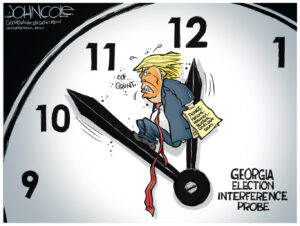
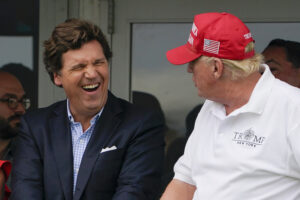
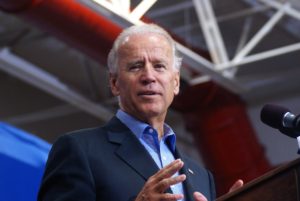

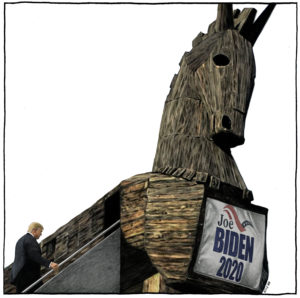


You need to be a supporter to comment.
There are currently no responses to this article.
Be the first to respond.